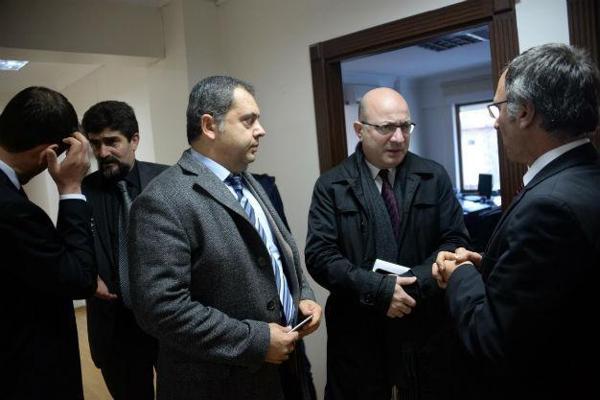Turkey's lawmakers urge restart of talks in Kurdish issue amid clashes
Rifat Başaran - ANKARA


DHA photo
Deputies from both opposition and ruling parties have urged a resumption of the peace process through dialogue amid renewed clashes in the southeast, with one Republican People’s Party (CHP) MP saying “low-intensity warfare is continuing” in the region.CHP Deputy Chairman Sezgin Tanrıkulu called on parties on Dec. 21 to “open a new way in parliament” for dialogue instead of clashes.
Turkey cannot solve the Kurdish problem with either ditches or tanks, he said, calling for a third way. The deputy delivered his remarks during a visit to the Sur district of southeastern Diyarbakır province where security forces and the youth organization of outlawed Kurdistan Workers’ Party (PKK) have been clashing for weeks.
The CHP is ready for dialogue for the resumption of talks, Tanrıkulu said, calling for the start of talks in parliament.
Ruling Justice and Development (AKP) deputy Orhan Miroğlu also warned that the fight against terrorism was not possible with a lack of democracy. Speaking at a press conference in parliament on Dec. 21, Miroğlu said they favored a “national consensus in parliament.”
“We want a discussion in parliament and [support a] stance of all our political parties against terror and violence with a national consensus, rather than with symbolic, daily moves,” Miroğlu said.
The Peoples’ Democratic Party (HDP), meanwhile, called for efforts that would bring “normal life” back to the areas affected by the sieges.
“The solution is never evacuation and depopulation of these cities. The solution is creating the environment for a return to normal life,” Ayhan Bilgen, a spokesperson for the HDP, said at a press conference on Dec. 21.
“The spokespersons for the government are saying we have been ‘legitimizing’ ditches. Ditch diggers do not need our discourse for legitimization,” Bilgen said.
CHP warns of ‘fraternity in danger’
Leading members of the CHP drew attention to the sense of “emotional disengagement” felt by Kurdish people over the “low-intensity conflict” in the predominantly Kurdish-populated southeastern province of Diyarbakır, warning that fraternity between the people in the west and the east of the country was “in danger.”
Hatay deputy Hilmi Yarayıcı and Istanbul deputy İlhan Cihaner paid a visit to Diyarbakır and its Sur district, the scene of violent clashes recently, with the consent of their party’s leader, Kemal Kılıçdaroğlu.
“Low-intensity warfare is proceeding there,” Yarayıcı told daily Hürriyet on Dec. 21. “The fraternity of the west and the east has been jeopardized.”
While in Diyarbakır, the CHP deputies held meetings with Diyarbakır Bar Association Deputy President Ahmet Özmen, Diyarbakır Co-Mayor Gültan Kışanak and Diyarbakır Gov. Hüseyin Aksoy as well as executives from the Diyarbakır branch of the Human Rights Association (İHD), the Southeast Journalists Association and Diyarbakır Chamber of Commerce and Industry and will draft a report to be shared with the CHP headquarters based upon the meetings and observations.
“Previously, clashes were taking place in mountains and rural areas. Now, we see with sadness that it is being turned into urban warfare. Identifying it as a low-intensity warfare is appropriate. There is need to quell it before it turns into a more intense conflict,” Yarayıcı said.
According to their survey in the field, 523 people have died in Diyarbakır and its towns because of conflicts in the 11 months from Jan. 1 to Dec. 5. Among those people, 171 were from Turkey’s security forces, 195 were militants of the outlawed Kurdistan Workers’ Party (PKK) and 157 were civilians. Reportedly, 135 of those casualties took place after a controversial Homeland Security Law was approved by President Recep Tayyip Erdoğan on April 3.
“We found a chance to have conversations with as many citizens as possible, shopkeepers, lawyers, simple citizens and Mayor Kışanak. Before everything else, they drew attention to one point: ‘What is being hurt is fraternity.’ They explained that in the current situation, a serious disengagement had been experienced. The generally shared view is: ‘What we call fraternity is the situation where our siblings, those who have been living in the west, feel what we live, understand us and give a voice to us. Since this is not being done, even mentioning fraternity is not appropriate,’” Yarayıcı said. “We have observed that there is an emotional disengagement with the ones living in the west, there is disappointment.”
Last week, Interior Minister Efkan Ala revealed that legal action had been taken against dozens of municipal authorities over of the use of municipally owned construction equipment in digging ditches in the region. The ditches are said to be dug by the youth branch or sympathizers of the PKK in order to keep security forces out of residential areas.
“At first, some shopkeepers and simple citizens showed reaction to those who dug ditches. Yet, clashes that took place after the declaration of curfews and security forces’ intervention into these districts with tanks and helicopters plagued citizens. Now, they show reaction to security forces and they regard those digging ditches more warmly. Those children behind the ditches are the children of people who migrated from villages [which were] forcibly evacuated in the 1990s. Now, since those who live [in these] districts will move to other places, the same kind of fury and reaction may go on,” Yarayıcı said, underlining that the residents in those places pinned hopes on the CHP to relaunch a process by which a peaceful and political solution can be discussed to end the conflict between Turkey’s security forces and the PKK.
